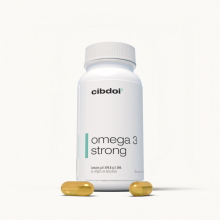Does Omega-3 Reduce Cholesterol?
Published:
Having healthy cholesterol levels is important for your cardiovascular health. High cholesterol raises your risk for heart disease, the leading cause of death worldwide. Many people turn to omega-3 supplements to help improve their cholesterol profile. But do omega-3 fatty acids really lower cholesterol? Let's objectively examine the scientific evidence.
Contents:
- What Are Omega-3s?
- Overview of Cholesterol
- How Do Omega-3s Affect Cholesterol?
- Clinical Research on Omega-3s and Cholesterol
- Omega-3 Dosage for Cholesterol Control
- Top Omega-3 Food Sources
- Other Nutrients That Lower Cholesterol
- Safety and Side Effects
- Should You Take Omega-3s for High Cholesterol?
- Does Omega-3 Reduce Cholesterol? Conclusion

What Are Omega-3s?
Omega-3 fatty acids are a type of polyunsaturated fat found in certain foods and supplements. The main omega-3s involved in human physiology are:
- ALA (alpha-linolenic acid)
- EPA (eicosapentaenoic acid)
- DHA (docosahexaenoic acid)
ALA is primarily found in plant sources like walnuts and flaxseed. EPA and DHA come from marine sources like fatty fish and fish oil supplements.
Your body can convert some ALA into EPA and DHA, but only in small amounts. That's why getting them directly from seafood or supplements is recommended.
Omega-3s provide many health benefits for your heart, brain, eyes and joints. But can they specifically improve your cholesterol?
Overview of Cholesterol
Before examining omega-3s and cholesterol, let’s briefly recap what cholesterol is:
- Waxy, fat-like substance made in the liver and found in bloodstream.
- Used to build cell membranes and make hormones like estrogen and testosterone.
- Carried in blood by proteins called lipoproteins.
There are two main types:
LDL cholesterol – Delivers cholesterol to cells. High levels increase heart disease risk. Called “bad” cholesterol.
HDL cholesterol – Removes excess cholesterol from blood back to liver for disposal. Called “good” cholesterol.
Ideal total cholesterol level is less than 200 mg/dL. LDL should be under 100 mg/dL and HDL over 40 mg/dL for men and 50 mg/dL for women.
How Do Omega-3s Affect Cholesterol?
Research shows omega-3s benefit cholesterol levels in several ways:
1. Lowers Triglycerides
Triglycerides are blood fats that increase heart disease risk when elevated. Omega-3s potently lower triglyceride levels, improving your overall lipid profile.
2. Increases HDL
Omega-3s raise levels of HDL, the “good” cholesterol that removes plaque-forming cholesterol from blood vessels.
3. Makes LDL particles larger
Small, dense LDL particles easily lodge in artery walls. Omega-3s make them larger and fluffier so they’re less likely to cause blockages.
4. Reduces LDL oxidation
Oxidized LDL is more atherogenic than normal LDL. Omega-3s help protect LDL particles from harmful oxidation.
5. Lowers Lipoprotein(a)
Lipoprotein(a) promotes blood clots and artery plaque formation. Omega-3 intake is associated with lower lipoprotein(a) levels.
This powerful multi-targeted impact on your entire cholesterol profile is what makes omega-3s so beneficial.
Clinical Research on Omega-3s and Cholesterol
But what does the clinical research say about omega-3s and cholesterol? Here are some of the key scientific findings:
- A meta-analysis of 27 trials concluded omega-3 supplementation lowers triglycerides and raises HDL, but has little effect on total or LDL cholesterol.
- A study in diabetics found 2 grams of omega-3s per day for 12 weeks lowered triglycerides by 20% and raised HDL by 19%.
- Several studies demonstrate fish oil lowers elevated triglycerides by 25-35% in dose-dependent fashion. 2-4 grams daily is optimal.
- Multiple trials show fish oil not only lowers triglycerides, but also reduces LDL particle number, which further decreases cardiovascular risk.
- Recent research confirms plant-based omega-3 ALA also reduces cholesterol levels, but not as potently as EPA/DHA sources.
- In people with already normal cholesterol, omega-3s provide little added benefit. They are most useful for treating high triglycerides.
Omega-3 Dosage for Cholesterol Control
If you want to use omega-3s for cholesterol optimization, what dosage should you aim for?
Here are the evidence-based recommendations:
- 1-2 grams daily: For healthy people with normal cholesterol levels looking for prevention. Can take as fish oil capsules or increased omega-3 foods.
- 2-4 grams daily: For elevated triglycerides. Typically requires concentrated fish oil capsules. Doses at the higher end of this range provide maximal reductions.
- 4 grams or more daily: For very high triglycerides generally requiring prescription omega-3 medication. Should be supervised by a doctor.
Work with your healthcare provider to determine the right omega-3 dosage for your cholesterol profile and heart disease risk status.
Top Omega-3 Food Sources
In addition to taking fish oil supplements, you can boost your omega-3 intake from foods:
Best sources:
- Fatty fish: salmon, mackerel, sardines, herring
- Seafood: oysters, crab, cod liver
- Fish oil
- Krill oil
Plant sources:
- Chia seeds
- Flaxseeds
- Walnuts
- Edamame
Aim for at least two 3.5 oz fish servings per week. Incorporate plant sources daily.
Other Nutrients That Lower Cholesterol
While extremely beneficial, omega-3s work best paired with other lifestyle and nutrition factors:
- Fiber - Soluble fiber from oats, avocados, beans lowers cholesterol absorption.
- Monounsaturated fats - Found in olive oil, avocados and nuts. Improve HDL and triglycerides.
- Soy protein - Shown to lower LDL cholesterol.
- Niacin - Vitamin B3; raises HDL when taken in pharmacological doses.
- Garlic - Contains compounds that reduce cholesterol synthesis in liver.
- Exercise - Regular cardio activity increases HDL and lowers triglycerides.
A comprehensive, multi-pronged approach works optimally for managing cholesterol.
Safety and Side Effects
Omega-3s from both fish and plant sources are very safe for the majority of people at supplemental dosages. The most common side effect is mild GI distress if taken without food.
Rarely, very high doses may increase bleeding risk in people taking anticoagulant medications. Check with your doctor first if taking blood thinners like warfarin. If you have a seafood allergy, avoid fish-sourced omega-3s.
Otherwise, omega-3s have an excellent safety profile. But discontinue use if any unusual symptoms develop.
Should You Take Omega-3s for High Cholesterol?
Research clearly demonstrates omega-3 fatty acids like EPA and DHA potently lower triglycerides and provide other benefits for your complete cholesterol profile and heart disease risk. For elevated triglycerides, omega-3s are among the most effective natural supplements to reduce levels. They also raise HDL and promote favorable lipid particle changes.
If you have high cholesterol or want to optimize cardiovascular health, an omega-3 supplement providing at least 1-2 grams combined EPA/DHA daily is an evidence-based addition to a heart healthy lifestyle. But work with your doctor to find the right dose for your individual cholesterol profile and needs.
Does Omega-3 Reduce Cholesterol? Conclusion
Maintaining optimal cholesterol levels is a key part of promoting cardiovascular wellness. Omega-3 fatty acids have been extensively researched for their cholesterol-lowering capabilities. Numerous studies confirm omega-3s from marine sources like fish oil supplements potently lower elevated triglycerides, raise HDL, decrease LDL particle number, reduce lipoprotein(a), and provide other anti-atherogenic benefits. For people with high triglycerides in particular, omega-3s are among the most effective natural supplements to improve cholesterol profile. A daily fish oil supplement providing at least 2-4 grams combined EPA and DHA can help normalize triglyceride readings. Omega-3s also work synergistically with other lifestyle measures like exercise, fiber intake and reducing saturated fats to optimize cholesterol levels and heart disease risk factors. When used responsibly, omega-3s are a safe and evidence-based way to promote healthy cholesterol balance.










